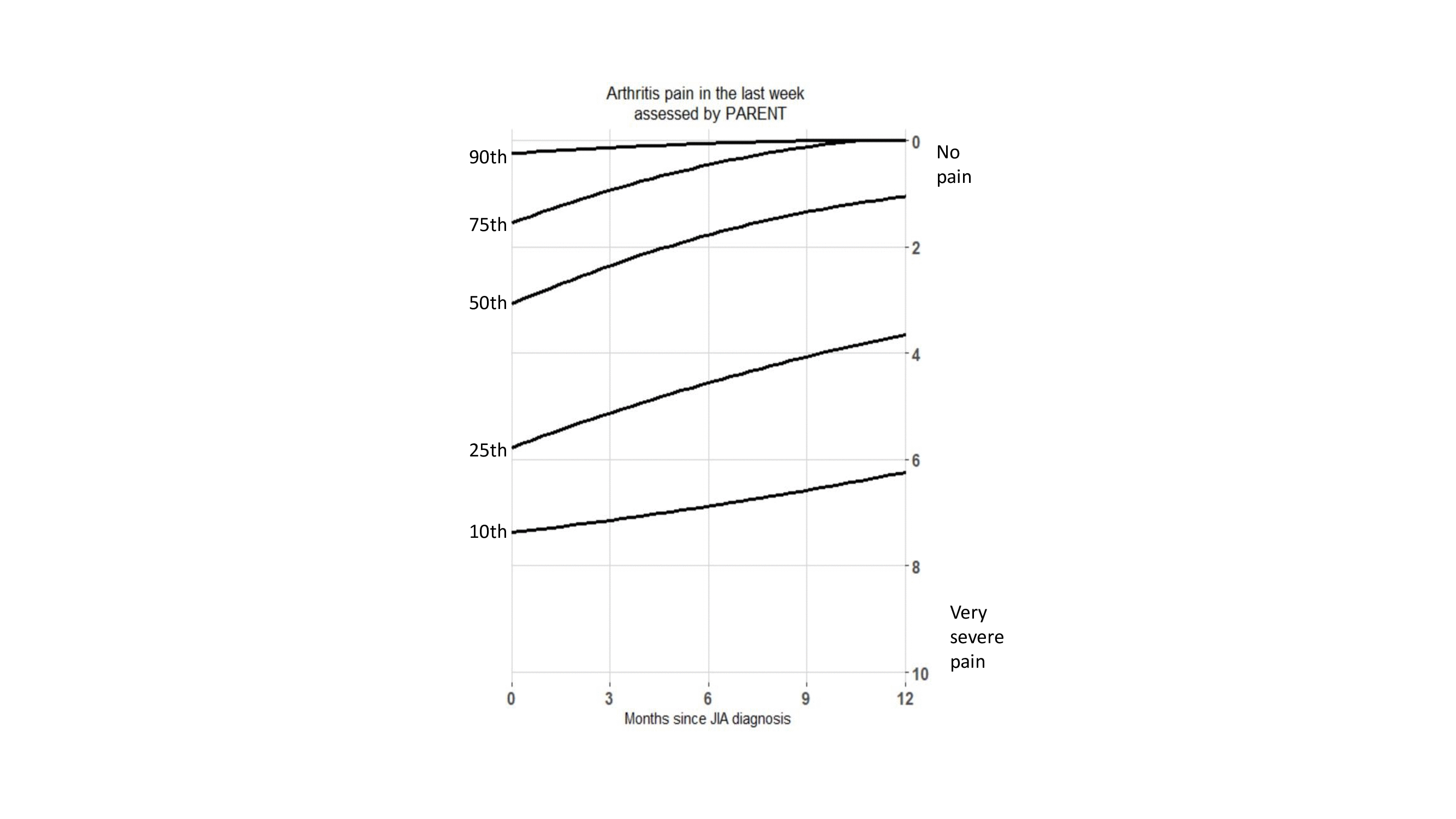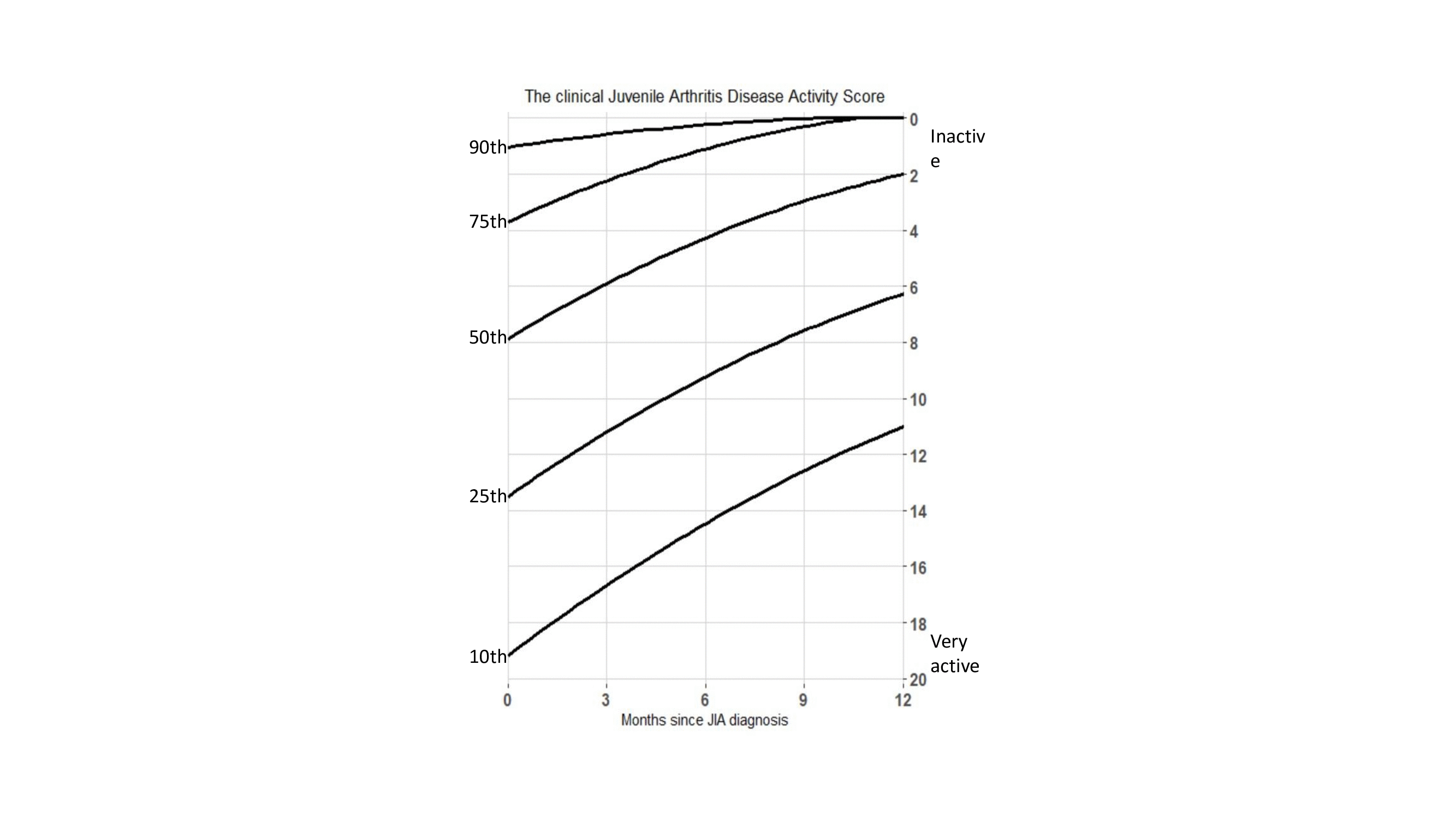Session Information
Date: Thursday, March 30, 2023
Title: Poster Breakout 2 - JIA & Uveitis: Genetics, Clinical & Therapeutic Aspects
Session Type: Breakout Session
Session Time: 5:10PM-5:40PM
Background/Purpose: When a diagnosis of juvenile idiopathic arthritis (JIA) is made, many parents are shocked to find out that arthritis occurs in children and may have concerns that arthritis is an incurable disease leading to inexorable deformities and disability. We know from research in the last 20 years that this is not the case for most, as the prognosis of JIA has improved substantially. But how do we convey this to families in an understandable and helpful way? We propose to use the analogy of growth charts and developed standard improvement curves of expected treatment-related improvements during the first year on pain, quality of life, and disease activity in children with JIA.
Methods: Data from the Canadian Alliance of Pediatric Rheumatology Investigators JIA Registry was used. Patients newly diagnosed with JIA were recruited from February 2017 to December 2021 (N=721) and followed as clinically indicated. At each clinic visit, self-reported pain intensity, Quality of My Life (QoML), and physician and parent global assessments were recorded in numerical rating scales from 0 to 10. The clinical Juvenile Arthritis Disease Activity Score 10 (cJADAS10) was the sum of physician and parent global, and the number of active joints up to 10.
Results: After assessing several parametric and non-parametric methods, Quantile Random Forests and LOWESS smoothing were used to chart the course of the 10th, 25th, 50th, 75th and 90th centiles for each measure during the first year after diagnosis and treatment initiation. A total of 721 children were recruited a median of 2 weeks after diagnosis, 61% were female and 44.5% had oligoarthritis (Table 1). During the first two years after diagnosis, there were a total of 3,671 visits that were used for plotting the charts. Using two years of data to produce curves for the first year improved their accuracy. During the first year, the 50th centiles changed from 3.5 to 1 for pain, from 3.5 to 1 for QoML, from 3 to 1 for the active joint count, and from 8 to 2 for the cJADAS10. The Figures provide examples of the resulting Charts.
Conclusion: Using real clinic data from Canadian children diagnosed with JIA in 2017-2021, we have produced standard curves of expected improvements during the first year after diagnosis that can be used to track individual childs progress and display for families how their child is doing in comparison to other children with JIA. These JIA Improvement Charts may assist families and physicians in making treatment decisions for the child. They may also help detect when early treatment adjustments are needed if improvement is faltering, in order to prevent long term damage.
 Table 1: Baseline characteristics of included patients
Table 1: Baseline characteristics of included patients
 Standard improvement curves for the 10th, 25th, 75th and 90th centiles in pain intensity during the first year after JIA diagnosis
Standard improvement curves for the 10th, 25th, 75th and 90th centiles in pain intensity during the first year after JIA diagnosis
 Standard improvement curves for the 10th, 25th, 50th, 75th and 90th centiles in CJADAS10 scores during the first year after JIA diagnosis.
Standard improvement curves for the 10th, 25th, 50th, 75th and 90th centiles in CJADAS10 scores during the first year after JIA diagnosis.
To cite this abstract in AMA style:
Chhabra A, Berkiwitz M, Loughin T, Tucker L, Boire G, Toupin-April K, Rumsey D, Batthish M, Li L, Huber A, Feldman B, Proulx-Gauthier J, Duffy C, Dancey P, Soon G, Schmeling H, Guzman J. Developing Standard Improvement Curves for Disease Activity, Pain and Quality of Life in Children with Newly Diagnosed Juvenile Idiopathic Arthritis: Results from the CAPRI Registry [abstract]. Arthritis Rheumatol. 2023; 75 (suppl 4). https://acrabstracts.org/abstract/developing-standard-improvement-curves-for-disease-activity-pain-and-quality-of-life-in-children-with-newly-diagnosed-juvenile-idiopathic-arthritis-results-from-the-capri-registry/. Accessed .« Back to 2023 Pediatric Rheumatology Symposium
ACR Meeting Abstracts - https://acrabstracts.org/abstract/developing-standard-improvement-curves-for-disease-activity-pain-and-quality-of-life-in-children-with-newly-diagnosed-juvenile-idiopathic-arthritis-results-from-the-capri-registry/
